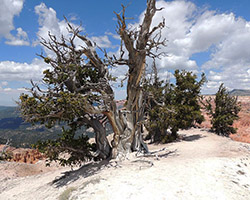Human: 122 years proven so far
Non-clonal tree- 5,065 years Bristlecone Pine
Clonal Trees-Aspen 80,000 years
spores-25 to 40 million years in their dormant state but can be woken up still
The Great Basin Bristlecone Pine (Pinus longaeva) is a species of pine tree. It is found in the American West, mostly in Utah, Nevada, and California. One of these trees has been measured to be 5,065 years old! That makes it the longest living non-clonal organism on Earth.partial quote:



An old Bristlecone Pine tree
So, getting back to the question...first, let's focus on non-clonal organisms (just one individual). The Great Basin Bristlecone Pine (Pinus longaeva) is a species of pine tree. It is found in the American West, mostly in Utah, Nevada, and California. One of these trees has been measured to be 5,065 years old! That makes it the longest living non-clonal organism on Earth.
However, some clonal organisms are known to have lifespans many times longer than that. An old stand of quaking aspen trees in Utah is actually one clonal male organism. All of the above-ground trees sprout from the same root system and so share the same genes. While each individual stem (or what you'd call the tree) lives an average of 130 years, the root system is estimated to be 80,000 years old. So technically, maybe the oldest living organism we know of is 80,000 years old.
Now, there is one other major way we could look at this question. What about eggs, seeds, or spores? These beginning stages of an organism can sometimes stay dormant (like a long pause) for months or years. Even in that case though, we'd still consider them alive, right? Would that change if they stayed dormant for millions of years? Some very old bacterial spores were in the gut of an extinct bee that was found in amber dating back to 25 to 40 million years ago.
end partial quote.
full quote including above:
What is the oldest living thing on Earth?
Submitted By:
Andy
Grade Level:
8
Answered by:
Karla Moeller
Hi, Andi.
What a great question! You may have heard that the oldest human lived to be 122 years old. But that amount of time only makes a small fraction of the lifespan of some other living things. Identifying the oldest organism gets a bit complicated when we start to think about what we consider an individual organism.
An individual is hard to define because some organisms make up clonal colonies. In clonal colonies, all individuals are part of or come from the same ancestral individual. For example, some mushrooms you see separately above ground are part of the same network underground. They may grow, reproduce, and appear to die, but a young mushroom nearby shares the exact same genes and is technically the same organism.

An old Bristlecone Pine tree
So, getting back to the question...first, let's focus on non-clonal organisms (just one individual). The Great Basin Bristlecone Pine (Pinus longaeva) is a species of pine tree. It is found in the American West, mostly in Utah, Nevada, and California. One of these trees has been measured to be 5,065 years old! That makes it the longest living non-clonal organism on Earth.
However, some clonal organisms are known to have lifespans many times longer than that. An old stand of quaking aspen trees in Utah is actually one clonal male organism. All of the above-ground trees sprout from the same root system and so share the same genes. While each individual stem (or what you'd call the tree) lives an average of 130 years, the root system is estimated to be 80,000 years old. So technically, maybe the oldest living organism we know of is 80,000 years old.
Now, there is one other major way we could look at this question. What about eggs, seeds, or spores? These beginning stages of an organism can sometimes stay dormant (like a long pause) for months or years. Even in that case though, we'd still consider them alive, right? Would that change if they stayed dormant for millions of years? Some very old bacterial spores were in the gut of an extinct bee that was found in amber dating back to 25 to 40 million years ago.
Spores are cells made during asexual reproduction. Even without being fertilized, they can develop into a new organism with the same genes as the organism that produced them. Spores often allow certain organisms to live through challenging conditions and regrow once conditions are more favorable. The bacteria from the bee gut were over 25 million years old, but scientists were able to get the spores to produce bacteria.
So you see, the oldest organism isn't exactly an easy label to assign. It depends on what you consider an individual or what you consider "living." Either way, it looks like the lifespan of the oldest organisms is in the range of thousands to millions of years. I hope that answers your question!
Have a different answer or more to add to this one? Send it to us.





No comments:
Post a Comment